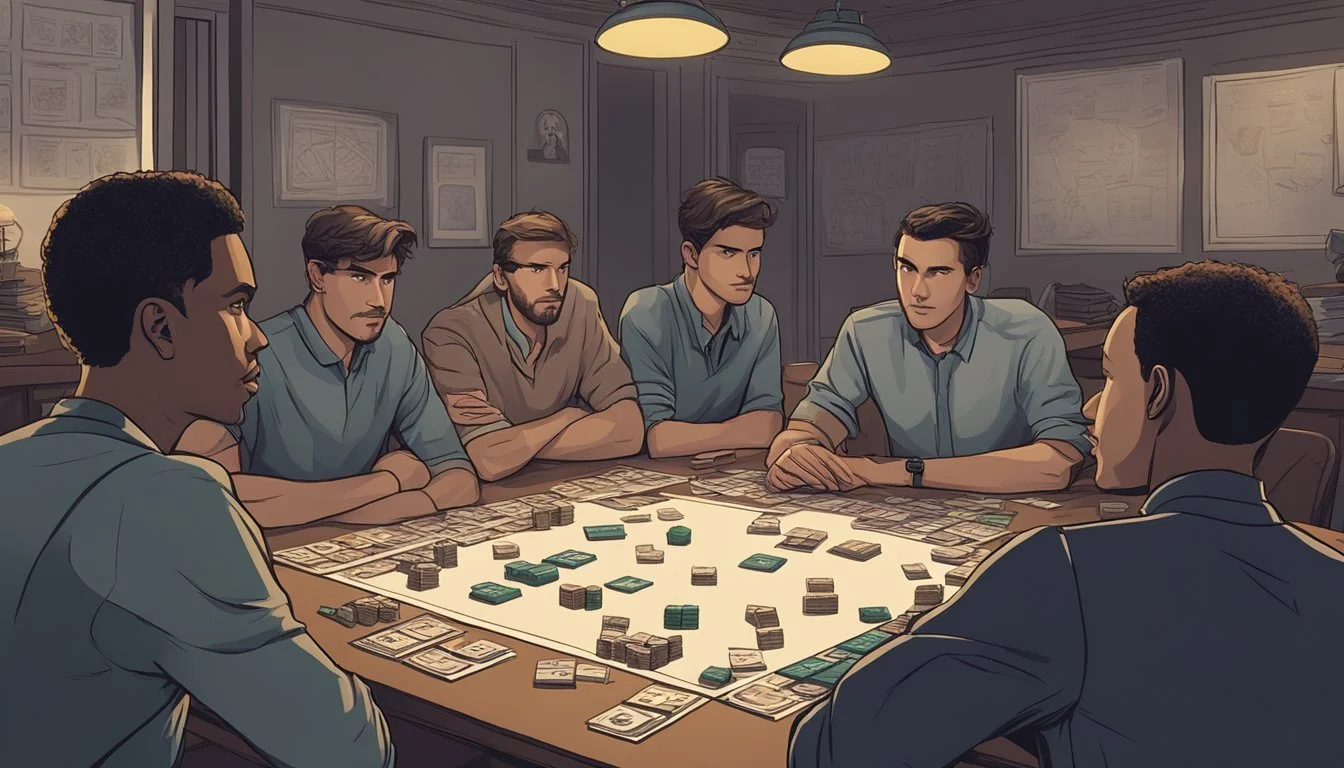Addressing Paranoia Questions: Identifying Key Indicators and Finding Help
Paranoia questions form the backbone of a popular party game that blends humor, curiosity, and social dynamics. Players take turns whispering questions to each other, with the recipient naming another participant as their answer. The twist? Everyone else gets to guess what the question was, leading to laughter and sometimes surprising revelations.
The game's appeal lies in its ability to spark conversation, create memorable moments, and bring friends closer together through shared laughter and playful speculation. From innocent inquiries to more daring prompts, paranoia questions can range widely in tone and content, catering to different group dynamics and comfort levels.
Selecting the right paranoia questions is key to ensuring an enjoyable experience for all players. Whether opting for clean, family-friendly options or spicier versions for adult gatherings, the game offers flexibility to suit various social settings. As participants navigate the delicate balance of honesty and discretion, they often discover new facets of their friendships and gain insights into how others perceive them.
Understanding Paranoia Questions
Paranoia questions form the core of a popular social game designed to create intrigue and amusement among friends. These questions typically involve selecting someone in the group as an answer, adding an element of mystery and excitement.
The game requires at least three players, though larger groups often lead to more engaging experiences. One person acts as the question master, whispering a question to another player who then answers by choosing someone in the group.
Questions can range from lighthearted to more personal topics. Some examples include:
"Who in this room would you trust with your deepest secret?"
"Which player is most likely to become famous?"
"Who here would survive the longest in a zombie apocalypse?"
The chosen person can then decide whether to hear the question, maintaining an air of secrecy and suspense. This dynamic creates a blend of curiosity, trust, and playful speculation among participants.
Paranoia questions often reveal interesting insights about group dynamics and individual perceptions. They can spark laughter, debates, and even deeper conversations, making the game a popular choice for social gatherings and ice-breaking activities.
Rules and Gameplay
The Paranoia game revolves around whispering questions and guessing answers. Players sit in a circle, taking turns to ask and respond to provocative or humorous inquiries about the group.
How to Play the Paranoia Game
Players form a circle. The first person whispers a question to the player on their right. This question typically starts with "Who is most likely to...?" The recipient answers by saying another player's name out loud. If the named person wants to know the question, they can ask, but must take a shot or face a penalty.
If they choose not to ask, play continues. The person who just answered now whispers a new question to the next player. The game progresses around the circle, with each player taking turns asking and answering.
Questions should be fun and mildly embarrassing, but not offensive. Players can pass if uncomfortable with a question.
Variations of Gameplay
Some groups play without the drinking element, using a point system instead. Players earn points for correct guesses or particularly funny answers. The first to reach a set number of points wins.
Another variation involves writing questions on slips of paper beforehand. Players draw questions randomly, adding an element of surprise.
For a more challenging version, players can be required to explain their answer. This leads to more laughter and discussion among the group.
Some groups set a time limit for answering to keep the game moving quickly. Others allow follow-up questions for more detailed and entertaining responses.
Themes and Categories
Paranoia questions span a range of topics, from lighthearted and humorous to deeply personal. They explore relationships, careers, and pop culture, providing diverse options for players to engage with during the game.
Funniest Paranoia Questions
Funny paranoia questions add levity to the game and often lead to laughter-filled moments. These questions typically focus on embarrassing situations or outrageous scenarios.
"Who's most likely to accidentally send a text to the wrong person?"
"Which player would survive the longest in a zombie apocalypse?"
"Who's most likely to trip and fall in public?"
These questions encourage players to think creatively and poke fun at each other in a good-natured way. They can reference common mishaps or absurd hypotheticals, making the game entertaining for all participants.
Deep and Personal
Deep and personal paranoia questions delve into players' thoughts, feelings, and experiences. They can spark meaningful conversations and reveal hidden aspects of people's personalities.
"Who in the group has the kindest heart?"
"Which player would you trust with your deepest secret?"
"Who's most likely to make a positive impact on the world?"
These questions encourage reflection and can strengthen bonds between players. They often touch on values, aspirations, and character traits, providing insights into how group members perceive each other.
Love and Relationships
Love and relationship-themed paranoia questions explore romantic interests, dating experiences, and relationship dynamics within the group.
"Who's most likely to have a secret crush on someone in this room?"
"Which player would make the best romantic partner?"
"Who's most likely to get married first?"
These questions can create excitement and intrigue, especially if there are potential couples or known attractions within the group. They often lead to playful teasing and speculation about romantic possibilities.
Career and Ambitions
Career and ambition-focused paranoia questions delve into players' professional goals, work ethic, and potential for success in various fields.
"Who's most likely to become a millionaire?"
"Which player would be the best CEO?"
"Who's most likely to start their own successful business?"
These questions can reveal players' perceptions of each other's strengths and abilities in the professional world. They often spark discussions about career aspirations and the paths to achieving them.
Pop Culture and Entertainment
Pop culture and entertainment paranoia questions tap into players' knowledge and opinions about celebrities, movies, TV shows, and current trends.
"Who's most likely to become a reality TV star?"
"Which player would win a lip-sync battle?"
"Who's most likely to have a secret celebrity crush?"
These questions allow players to showcase their pop culture knowledge and can lead to lively debates about favorite celebrities or entertainment preferences. They often reference popular movies, TV shows, or trending topics in the media.
Choosing the Right Setting
The setting for playing paranoia questions can greatly influence the game experience. Consider the atmosphere, participants, and available platforms when deciding where to play.
Party Environment
Parties provide an ideal backdrop for paranoia questions. The relaxed, social atmosphere encourages openness and laughter. Choose a comfortable area where players can sit in a circle. Dim lighting can add to the secretive nature of the game.
Background music at a low volume helps fill awkward silences. Ensure there's enough space for players to whisper questions without others overhearing. Have snacks and drinks readily available to keep the mood light and festive.
Family Game Night
Paranoia questions can be adapted for family-friendly fun. Select age-appropriate questions that won't cause discomfort. The living room or dining area works well for gathering everyone together.
Set clear boundaries and rules before starting. This ensures the game remains enjoyable for all ages. Consider using a timer to keep the game moving and maintain engagement. Have prizes ready for creative answers or most questions answered.
Online Platforms
Video chat apps enable remote play of paranoia questions. Choose a platform all participants can easily access. Use the private chat feature for whispering questions.
Screen sharing allows for displaying game rules or question lists. Online whiteboards can track points or display random question generators. Consider using a dedicated game-hosting website for a more structured experience.
Social media platforms can facilitate asynchronous play. Create a private group or use direct messaging for question exchanges. This format allows for extended gameplay over days or weeks.
Navigating Sensitivities
Paranoia questions can venture into personal territory. Players should be mindful of others' feelings and establish clear boundaries. Maintaining a respectful atmosphere ensures everyone has fun without discomfort.
Respecting Boundaries
Set ground rules before starting the game. Establish topics that are off-limits, such as deeply personal matters or sensitive subjects. Allow players to skip questions they find uncomfortable without explanation. Create a signal for participants to use if they want to change the subject. Respect "no" as a complete answer and move on without pressuring anyone.
Consider the relationships within the group. Questions appropriate for close friends may not suit coworkers or acquaintances. Tailor the game to fit the social dynamics present.
Ensuring Comfort
Keep the atmosphere light and playful. Avoid questions that single out or embarrass specific individuals. Mix in lighthearted topics to balance more personal ones. Pay attention to body language and facial expressions for signs of discomfort.
Offer breaks during longer game sessions. This gives players time to regroup and assess their comfort levels. Provide non-alcoholic drink options to ensure everyone can participate safely.
Handling Revealed Secrets
Establish a "what happens in the game, stays in the game" policy. Emphasize the importance of discretion regarding information shared during play. Discourage gossip or discussing revelations outside the group.
If sensitive information comes to light, address it maturely. Avoid judgment or teasing about revealed secrets. Support players who may feel vulnerable after sharing personal details. Consider having a brief group discussion about trust and confidentiality if needed.
Advanced Variants and Challenges
Paranoia questions can be taken to new levels with creative twists. These variations amp up the excitement and push players out of their comfort zones.
Hot Seat Questions
Hot seat questions ratchet up the intensity of paranoia games. One player sits in the "hot seat" while others take turns asking direct, probing questions. The hot seat player must answer truthfully or face a penalty. Questions often focus on personal preferences, embarrassing moments, or hypothetical scenarios.
Popular hot seat questions include:
"What's your most embarrassing childhood memory?"
"If you could switch lives with anyone here, who would it be and why?"
"What's the biggest lie you've ever told?"
Players can set a time limit, like 2 minutes, for rapid-fire questioning. This creates pressure and leads to more spontaneous, revealing answers.
Dare-Based Enquiries
This variant combines paranoia questions with dares for added excitement. Players ask questions as usual, but the person named must complete a dare. Dares range from silly to risqué depending on the group.
Sample dare-based questions:
"Who's most likely to streak down the street?" (Dare: Run outside and yell loudly)
"Who could drink 10 shots of alcohol fastest?" (Dare: Take a shot of hot sauce)
"Who's the biggest flirt?" (Dare: Use a cheesy pickup line on someone)
Players can veto overly extreme dares. Setting boundaries beforehand ensures everyone stays comfortable while still having fun with more challenging paranoia variants.
Playing Paranoia Questions Responsibly
Paranoia questions can be an entertaining party game, but it's important to approach it responsibly. Players should set clear boundaries and agree on appropriate topics beforehand. Avoid questions that could make others genuinely uncomfortable or cause distress.
It's crucial to respect privacy and consent. If someone doesn't want to participate or answer a particular question, their decision should be respected without pressure. Be mindful of personal sensitivities and relationships within the group.
Alcohol should not be a requirement for playing. While some may choose to drink, it's essential to have non-alcoholic options available. Never pressure anyone to consume alcohol, and always prioritize safety.
Designate a responsible person to monitor the game and ensure it doesn't get out of hand. This individual can intervene if questions become too invasive or if anyone appears uncomfortable.
Avoid topics that could lead to dangerous behavior, such as dares involving selfies in risky situations or challenges that might disrupt public spaces. The game should remain lighthearted and fun without compromising safety or legality.
Consider the setting when playing. A casual gathering with friends is more appropriate than places requiring focus, like school or work environments. Laughter is encouraged, but be mindful of timing and context to avoid disrupting serious moments.
Enhancing the Experience
Elevate your paranoia game with creative twists and technological tools. These innovative approaches add excitement and fresh dynamics to keep players engaged.
Creative Variations
Mix up the classic paranoia format with fun alternatives. Try "Rapid Fire" rounds where players ask and answer questions in quick succession. Introduce themed rounds focused on topics like celebrity gossip or favorite foods. Play "Reverse Paranoia" where the asker must guess who the group chose as the answer. Use props or costumes to inspire unique questions. Create a "Truth or Dare" hybrid by allowing players to choose between answering a paranoia question or completing a dare. Incorporate drawing or acting elements for visual clues.
Using Technology
Leverage digital tools to streamline gameplay and add new dimensions. Use random question generator apps to keep the game flowing. Create custom question sets with online quiz makers. Set up a group chat or social media poll for anonymous voting. Try video chat paranoia for long-distance play. Record funny moments with your phone's camera. Use name randomizer apps to pick players. Play music trivia paranoia with streaming services. Explore paranoia-style party games on gaming consoles. Create a TikTok challenge based on the funniest paranoia moments.
Potential Risks of Paranoia Questions
Paranoia questions can pose several risks to participants and group dynamics. While often intended as a fun game, these questions may lead to unintended consequences.
Personal secrets or sensitive information might be revealed against someone's wishes. This can damage trust within the group and potentially harm relationships.
Some questions may target individuals unfairly, leading to feelings of isolation or embarrassment. This can negatively impact the targeted person's self-esteem and social standing.
The game may bring hidden conflicts or jealousies to the surface. This can create tension and disrupt group harmony, especially if people feel betrayed by others' answers.
Reputation damage is a significant concern. Answers given during the game could spread beyond the immediate group, affecting how others perceive an individual in various social or professional contexts.
Some participants might feel pressured to answer questions they're uncomfortable with. This can create anxiety and resentment, potentially leading to regret after the game ends.
The competitive nature of the game may encourage participants to exaggerate or lie. This behavior can erode trust and honesty within the group, even after the game concludes.







